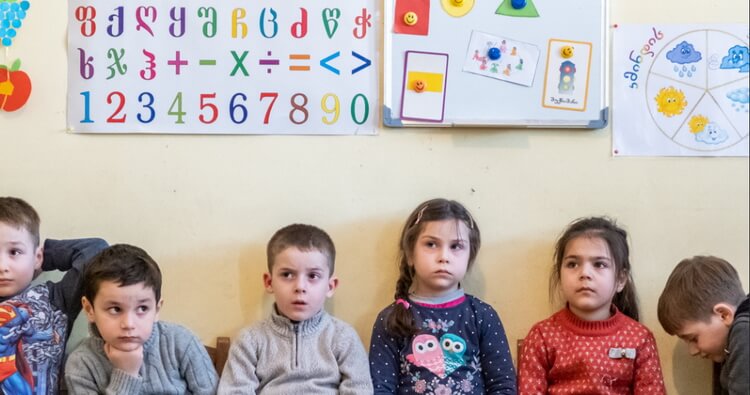Study: children in Georgian kindergartens exposed to harmful particles

Air quality for children in nearly 60 kindergartens in nine municipalities was studied by professionals, with data from the report generating recommendations and calls for further research. Photo: Seb Higginson, Hayley Jewett/via WECF Georgia/NCDC study.
Children in public kindergartens in Georgia are exposed to elevated levels of harmful particles in indoor air, a newly published study has shown.
Conducted jointly by the Georgian branch of Women in Europe for a Common Future and the National Centre for Disease Control and Public Health, the study showed increased levels of particulate matter (PM) at 59 kindergartens, mostly due to emissions from wood-burning stoves.
The two organisations carried out their measurements over the winter and spring season of 2019-2020, in kindergartens located in three regions of Georgia, and found PM levels at stove-equipped facilities to be 2,4 times higher than at venues with central heating and natural gas.
Despite this study's small sample size, the data demonstrates that our children and their caregivers are being exposed to poor air quality and are not spending enough time outside" - WECF Georgia/NCDC study
A lack of open-air time during heating seasons, low awareness on indoor air quality management on kindergarten staff's behalf, and not enough ventilation are all cited as exacerbating factors in the data.
60% of the kindergartens do not take their children outside during the heating season, and only a fraction takes them outside for two hours or more" - WECF Georgia/NCDC study
The report outlines a series of recommendations ranging from practical advice on increased time outside for children, improved ventilation, and ensuring proper functioning of stoves and chimneys at facilities, to the wider solution of replacing wood-burning stoves with centralised heating.
Beside practical recommendations on immediate means for improving air quality at the venues, the WECF Georgia/NCDC report also calls for further research of the subject, and for adoption of a legal framework around the problem.
As further context for their study, WECF Georgia has cited figures from Our World in Data that show Georgia having one of the highest mortality rates from indoor air pollution in the PAN European region, with 1,900-2,900 deaths from the cause annually, along with health complications.
 Tweet
Tweet  Share
Share